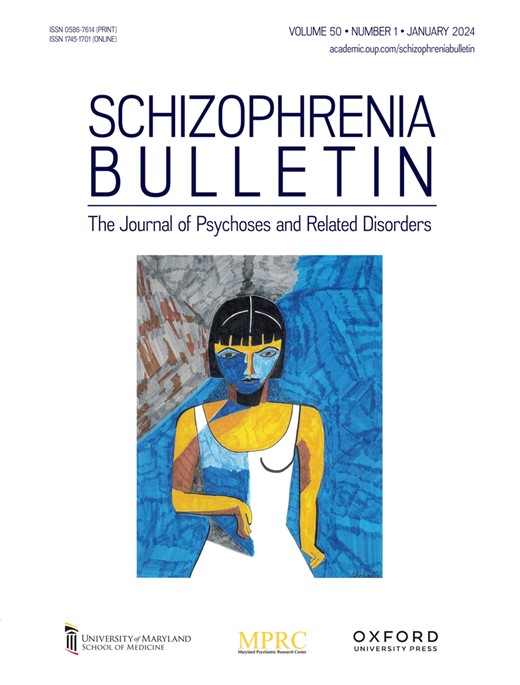Late-Onset Neutropenia in Clozapine Users: Unrelated or Drug-Induced? A Case-Registry Analysis of Incidence, Characteristics, and Rechallenge Attempts
IF 4.8
1区 医学
Q1 PSYCHIATRY
引用次数: 0
Abstract
Background and Hypothesis Clozapine treatment carries a risk of blood dyscrasias (BD) and requires indefinite monitoring in many jurisdictions, a major factor in its under-utilization. Although previous studies suggest BD risk is highest early in treatment, BD events have also been reported after many years. This study compares early vs late (>6 months) suspected blood dyscrasias (SBD) and examines rechallenge outcomes as a marker for clozapine-related causation. Study Design A retrospective analysis of electronic health records from a large UK mental health service gathered demographic data, characteristics of SBD events, and outcomes of clozapine rechallenge, defined as reinitiation after SBD-related discontinuation. These variables were compared between early- and late-onset SBD groups using a 6-month treatment duration cutoff. Study Results Of 130 patients with SBD leading to clozapine cessation, 59 had early-onset SBD. The incidence rate before 6 months was 5.54% per year vs 0.53% after 6 months, reflecting an incidence rate ratio of 10.4. Early-onset patients were younger, received lower clozapine doses, and had fewer concurrent antipsychotics. Of 81 rechallenge attempts, 71 (87.7%) were successful, with a mean follow-up of 2.5 years. No significant differences in characteristics or rechallenge outcomes were found between the early- and late-onset groups. Conclusions Though less frequent, late-onset SBD shares similar characteristics with early-onset SBD and has a comparable risk of recurrence on clozapine rechallenge. Vast majority of clozapine rechallenges are successful, including early-onset BD, suggesting they are not clozapine-induced. However, clozapine-induced BD, defined by recurrence upon rechallenge, may rarely occur even after years of treatment.氯氮平使用者迟发性中性粒细胞减少症:无关还是药物引起的?病例登记分析的发生率、特征和再挑战的尝试
背景和假设氯氮平治疗有血液异常(BD)的风险,在许多司法管辖区需要无限期监测,这是其未充分利用的主要因素。虽然以前的研究表明,双相障碍风险在治疗早期最高,但也有许多年后双相障碍事件的报道。本研究比较了早期和晚期(6个月)疑似血液异常(SBD),并检查了再挑战结果作为氯氮平相关病因的标志。研究设计回顾性分析了来自英国一家大型精神卫生服务机构的电子健康记录,收集了人口统计数据、SBD事件的特征和氯氮平再挑战的结果,定义为SBD相关停药后的重新开始。这些变量在早期和晚发性SBD组之间进行比较,使用6个月的治疗时间截止。研究结果在130例导致氯氮平停药的SBD患者中,59例为早发性SBD。6个月前的发病率为5.54% /年,6个月后的发病率为0.53% /年,发病率比为10.4。早发患者较年轻,接受较低的氯氮平剂量,同时使用较少的抗精神病药物。81例再挑战中,71例(87.7%)成功,平均随访2.5年。在早发组和晚发组之间没有发现特征或再挑战结果的显著差异。结论迟发性SBD虽然发病率较低,但与早发性SBD具有相似的特征,并且在氯氮平再给药后复发的风险相当。绝大多数氯氮平再挑战是成功的,包括早发性双相障碍,这表明它们不是氯氮平引起的。然而,氯氮平诱导的双相障碍,定义为再挑战后复发,即使经过多年的治疗也很少发生。
本文章由计算机程序翻译,如有差异,请以英文原文为准。
求助全文
约1分钟内获得全文
求助全文
来源期刊

Schizophrenia Bulletin
医学-精神病学
CiteScore
11.40
自引率
6.10%
发文量
163
审稿时长
4-8 weeks
期刊介绍:
Schizophrenia Bulletin seeks to review recent developments and empirically based hypotheses regarding the etiology and treatment of schizophrenia. We view the field as broad and deep, and will publish new knowledge ranging from the molecular basis to social and cultural factors. We will give new emphasis to translational reports which simultaneously highlight basic neurobiological mechanisms and clinical manifestations. Some of the Bulletin content is invited as special features or manuscripts organized as a theme by special guest editors. Most pages of the Bulletin are devoted to unsolicited manuscripts of high quality that report original data or where we can provide a special venue for a major study or workshop report. Supplement issues are sometimes provided for manuscripts reporting from a recent conference.
 求助内容:
求助内容: 应助结果提醒方式:
应助结果提醒方式:


